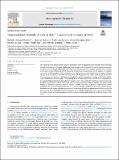Por favor, use este identificador para citar o enlazar a este item:
http://hdl.handle.net/10261/334330COMPARTIR / EXPORTAR:
 SHARE SHARE
 CORE
BASE CORE
BASE
|
|
| Visualizar otros formatos: MARC | Dublin Core | RDF | ORE | MODS | METS | DIDL | DATACITE | |

| Título: | Unprecedented warmth: A look at Spain's exceptional summer of 2022 |
Autor: | Serrano-Novoli, Roberto; Tejedor, Ernesto CSIC ORCID; Sarricolea, Pablo; Meseger-Ruiz, Oliver; de Luis, Martín; Saz-Sánchez, Miguel Ángel CSIC ORCID; Longares, Luis Alberto; Olcina, Jorge | Palabras clave: | Heat waves Drought Breaking records Extreme anomalies Paleoclimate perspective |
Fecha de publicación: | 15-sep-2023 | Editor: | Elsevier | Citación: | Atmospheric Research 293: 106931 (2023) | Resumen: | The warming of the global climate system is expected to result in significant socio-economic stress, primarily through the occurrence of extreme weather and climate events, with the potential for severe impacts on societies. This was evidenced by the vulnerability of European nations during the 2003 summer heatwave, which resulted in the death of tens of thousands of individuals due to heat-related complications. In this analysis, we examine the summer of 2022 in Spain, a Mediterranean country that is among the most impacted by the effects of climate change. A distinct pattern of the subtropical ridge in the 500 hPa geopotential height, which is typically linked to the occurrence of heatwaves in the Iberian Peninsula (IP), and the atmospheric blocking in the North Atlantic region facilitated the southerly flow of exceptionally warm air masses from Africa towards the IP, contributing to the sustained high temperatures throughout the summer season. Our results show that Spain experienced recordbreaking temperatures in nearly half of the country that favored more frequent, intense, and longer-lasting heatwaves compared to previous historical records available from 1893. In general, despite normal rainfall conditions, the extremely high temperatures led to intense drought conditions in most areas. Finally, the paleoclimatic records suggest that the average summer temperature of 2022 was unprecedented within the last 700 years, and the driest within the last 279 in NE Spain. These findings highlight the need for measures to mitigate the effects of heat on at-risk populations, and to increase resilience and adaptation to climate change in the future. | Versión del editor: | https://doi.org/10.1016/j.atmosres.2023.106931 | URI: | http://hdl.handle.net/10261/334330 | DOI: | 10.1016/j.atmosres.2023.106931 | ISSN: | 0169-8095 |
| Aparece en las colecciones: | (MNCN) Artículos |
Ficheros en este ítem:
| Fichero | Descripción | Tamaño | Formato | |
|---|---|---|---|---|
| Tejedor_E_Unprecedented.pdf | Artículo principal | 5,38 MB | Adobe PDF |  Visualizar/Abrir |
CORE Recommender
SCOPUSTM
Citations
5
checked on 22-abr-2024
WEB OF SCIENCETM
Citations
1
checked on 23-feb-2024
Page view(s)
31
checked on 27-abr-2024
Download(s)
24
checked on 27-abr-2024
Google ScholarTM
Check
Altmetric
Altmetric
Este item está licenciado bajo una Licencia Creative Commons

